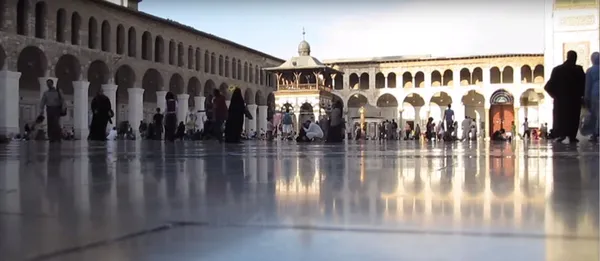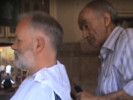Eye For Film >> Movies >> Lihya (2010) Film Review
Lihya
Reviewed by: Andrew Robertson

Mike Windle is an artist. Here he goes for a haircut, and a shave. Is that it? That is it. He reads something from a bit of paper at the start, it becomes a lesson in Arabic - this is Syria, you see. Mike is staying there, for a time. Given the heat getting rid of the beard seems a reasonable proposition. There is Mike, then. It is Adel Al Zaiek's barber shop. Irfan sits on the bench and there is conversation.
28 minutes of it, in fact. It rambles, as hairdresser conversations are wont to do. Mel Gibson's nationality, advice on pronunciation. Tea is fetched, drunk. As time passes questions start to be asked about what it is that we are watching. There aren't any surprises here - we are watching a man getting his hair cut, having a shave. Yet we find that we are still watching it, almost half an hour later. One starts to wonder how it came to be constructed - there are at least six seperate camera angles; latterly one catches site of someone crouched in the corner, wielding a handycam. Sequences where hardly a hair seems to have moved suddenly seem to be retakes, the steady click click click of the blades slicing only air.

There's mention of Pink Floyd's The Wall, the desire to learn English to understand what exactly was happening in that film. There are shots of a junction box, someone replacing a brush after sweeping the street outside. There are photographs, talk of Vienna, the Danube, but as this afternoon in Damascus progresses the real questions are about why it is that we are watching what we are watching, why it was that it was made.
It's a documentary, one supposes - these things actually happened, even if they were reconstructed, perhaps close to if not at the time. So it's reality, but mediated, but is it noticeable reality? What is occuring in front of the camera(s) and is again appearing in front of them to get a different angle and why are we watching it? It's a slice of life - let's call it that. It's pleasant enough, but not striking. It might be video art rather than film, but there are things that are missing - Lihya, for example, means 'beard' - "that which grows on the chin", but discussions as to its import are not present. It's two people talking while a third cuts hair - it passes the time. Given the choice, there are better ways to spend time.
Reviewed on: 25 Feb 2011















